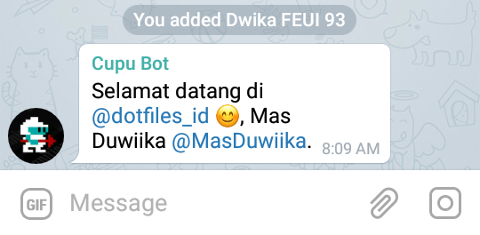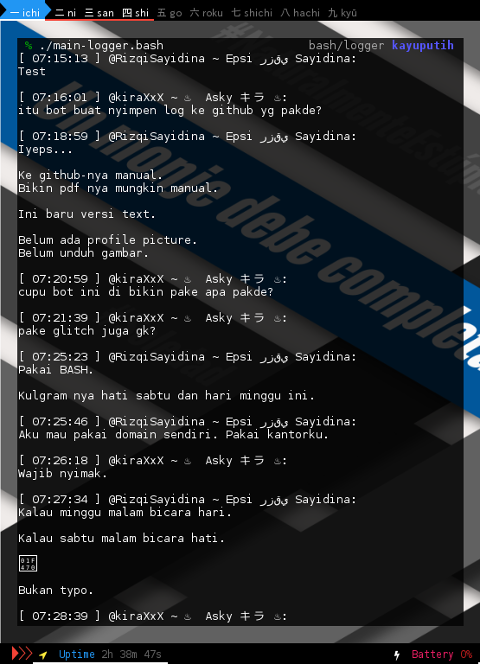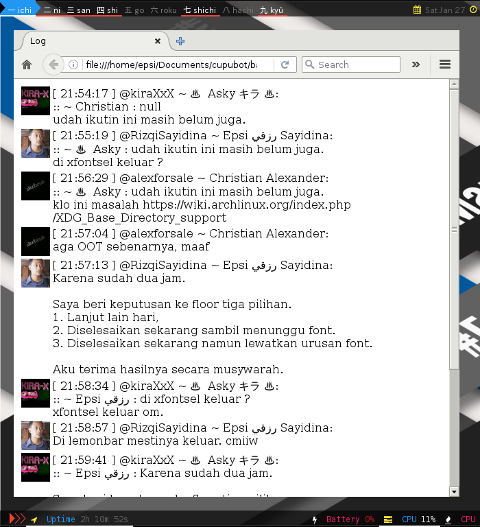Bashful Bot
Goal: Basic Bot Tools: New Member, Text Logger, Web Logger
We’re almost finished. It is time to connect our lovely Bot to Group. Like many other project, ideas always comes out. This is the last part in BASH before we move on to other shell, such as FISH.
These are a few group feature
-
Chat New Member: Greet any new member in group
-
Text Logger: Text only, no images
-
HTML Logger: With user Avatar, no images, nor sticker
I haven’t got any time to implement image and sticker. It is pretty easy actually with Telegram API. But I’m pretty busy right now. It is your turn to practice.
For most real group log, I utilize web telegram, and print to PDF feature from browser.
Prerequisite
To enable this group tools.
-
Disable privacy in your chat bot so the chat would listen to all conversations.
-
Add your lovely bot to your chat group.
Change in Main File
main.bash:
#!/usr/bin/env bash
# This is a telegram bot in bash
DIR="$( cd "$( dirname "${BASH_SOURCE[0]}" )" && pwd )"
# module: main
. ${DIR}/config.bash
. ${DIR}/messages.bash
. ${DIR}/options.bash
. ${DIR}/controller.bash
# module: task
. ${DIR}/tasks/observe.bash
. ${DIR}/tasks/reply.bash
. ${DIR}/tasks/new_member.bash
. ${DIR}/tasks/logger_text.bash
. ${DIR}/tasks/logger_html.bash
### -- main --
get_options_from_arguments "$@"Source:
config.bash:
The config is exactly the same as previous guidance, except these two lines, that required for logger.
...
### -- logfile --
log_file_text=~/Documents/logfile.txt
log_file_html=~/Documents/logfile.htmlSource:
messages.bash:
#!/usr/bin/env bash
function message_usage() {
cat <<-EOF
usage: cupubot [options]
operations:
general
-h, --help display help information
-v, --version display version information
--observe show JSON output of getUpdates
--reply reply all messages
--new-member greet new member
--logger-text log chat conversation
--logger-html log chat conversation
EOF
}
function message_version() {
local version='v0.001'
echo "cupubot $version"
}Source:
options.bash:
# handling --command
function handle_command_optarg() {
local command=$1
case "$command" in
version)
message_version
exit;;
help)
message_usage
exit;;
observe)
do_observe
exit;;
reply)
loop_reply
exit;;
new-member)
loop_newmember
exit;;
logger-text)
do_logger_text
exit;;
logger-html)
do_logger_html
exit;;
*)
# Invalid Option
message_usage
exit;;
esac
}Source:
controller.bash:
#!/usr/bin/env bash
### -- task controller --
function do_observe() {
process_observe
}
function loop_reply() {
while true; do
process_reply
sleep 1
done
}
function loop_newmember() {
while true; do
process_newmember
sleep 1
done
}
function do_logger_text() {
# empty logger file
[[ -f $log_file_text ]] && rm $log_file_text
process_logger_text
}
function do_logger_html() {
# empty logger file
[[ -f $log_file_html ]] && rm $log_file_html
cat << EOF >> $log_file_html
<html>
<head>
<title>Log</title>
<meta charset="utf-8">
</head>
<body>
<table>
EOF
process_logger_html
cat << EOF >> $log_file_html
</table>
</body>
</html>
EOF
} Source:
Chat New Member
This functions script is a little bit different, compared with the previous example.
tasks/new_member.bash:
#!/usr/bin/env bash
function process_newmember() {
# global-project : last_id
# global-module : _
local i update message_id chat_id
local updates=$(curl -s "${tele_url}/getUpdates?offset=$last_id")
local count_update=$(echo $updates | jq -r ".result | length")
[[ $count_update -eq 0 ]] && echo -n "."
for ((i=0; i<$count_update; i++)); do
update=$(echo $updates | jq -r ".result[$i]")
last_id=$(echo $update | jq -r ".update_id")
message_id=$(echo $update | jq -r ".message.message_id")
chat_id=$(echo $update | jq -r ".message.chat.id")
local update_with_new_member=$(echo $update | jq -r ".message | select(.new_chat_member != null)")
if [ -n "$update_with_new_member" ];
then
get_feedback_newmember "$update"
# display on standard output
echo -e "\n: ${return_feedback}"
result=$(curl -s "${tele_url}/sendMessage" \
--data-urlencode "chat_id=${chat_id}" \
--data-urlencode "text=$return_feedback"
);
fi
last_id=$(($last_id + 1))
echo $last_id > $last_id_file
done
}
function get_feedback_newmember() {
# global-module : return_feedback
local update=$1
local new_chat_member=$(echo $update | jq -r ".message.new_chat_member")
local first_name=$(echo $new_chat_member | jq -r ".first_name")
local last_name=$(echo $new_chat_member | jq -r ".last_name")
local username=$(echo $new_chat_member | jq -r ".username")
# "😊"
return_feedback="Selamat datang di @dotfiles_id 😊, $first_name $last_name @${username}."
}Source:
Execute
Let us see it in action. Add your good friend to a telegram chat group. No need to say something. And run the script.
% ./main.bash --new-member
How does it works ?
This below is the JSON part. All we need to know is the JSON path message.new_chat_member
{
"update_id": 140984590,
"message": {
"message_id": 1786,
...
"new_chat_member": {
"id": 216278915,
"is_bot": false,
"first_name": "Mas",
"last_name": "Duwiika",
"username": "MasDuwiika"
},
...
}
}The bot only responsive, if this path popped out in telegram updates. And the rest is parsing the path.
Consider, check the smartphone.

Text Logger
I enjoy making an online tutorial at telegram chat group. Why not go further, by logging it. And the script is even simple. It needs no loop.
The functions are entirely different, compared with the previous one.
tasks/logger_text.bash:
#!/usr/bin/env bash
function process_logger_text() {
# global-project : last_id
# global-module : _
local i update message
local updates=$(curl -s "${tele_url}/getUpdates")
local count_update=$(echo $updates | jq -r ".result | length")
for ((i=0; i<$count_update; i++)); do
update=$(echo $updates | jq -r ".result[$i]")
message=$(echo $update | jq -r ".message")
last_id=$(echo $update | jq -r ".update_id")
get_log_text_line "$message"
echo -e "${return_log_line_text}" | tee -a $log_file_text
last_id=$(($last_id + 1))
# echo $last_id > $last_id_file
done
}
function get_log_text_line() {
# global-module : return_log_line_text
local message=$1
local chat_id=$(echo $message | jq -r ".chat.id")
local from=$(echo $message | jq -r ".from")
local first_name=$(echo $from | jq -r ".first_name")
local last_name=$(echo $from | jq -r ".last_name")
local username=$(echo $from | jq -r ".username")
local unixdate=$(echo $message | jq -r ".date")
local textdate=$(date -d @$unixdate +'%H:%M:%S')
local text=$(echo $message | jq -r ".text")
local message_is_reply=$(echo $message | jq -r "select(.reply_to_message != null)")
if [ -n "$message_is_reply" ];
then
local reply=$(echo $message | jq -r ".reply_to_message")
local reply_text=$(echo $reply | jq -r ".text")
local reply_first_name=$(echo $reply | jq -r ".from.first_name")
text=":: ~ ${reply_first_name} : ${reply_text}\n\n${text}"
fi
return_log_line_text="[ $textdate ] @${username} ~ $first_name $last_name:\n$text\n\n"
}Source:
Execute
Consider see it in action. Just run the script.
% ./main.bash --logger-textForgive me for my old screenshot. This is before utilizing getopt.

How does it works ?
Just dump all the text messages. Nothing special here.
HTML Logger
HTML logging has no big differences with Text logging. HTML is actually just a text with tag. It is just, has nicer preview.
The only different is, HTML logger require Avatar images. Which is, this URL require a few steps of Telegram API. As an implementation, there is this badass script.
tasks/logger_html.bash:
#!/usr/bin/env bash
function process_logger_html() {
# global-project : last_id
# global-module : _
local i update message avatar_image
local updates=$(curl -s "${tele_url}/getUpdates")
local count_update=$(echo $updates | jq -r ".result | length")
[[ $count_update -eq 0 ]] && echo -n "."
for ((i=0; i<$count_update; i++)); do
update=$(echo $updates | jq -r ".result[$i]")
message=$(echo $update | jq -r ".message")
last_id=$(echo $update | jq -r ".update_id")
get_avatar "$message"
get_log_html_line "$message"
# display on standard output
echo -e "${return_log_line_text}"
avatar_image="<img src='${return_avatar_url}' height='42' width='42'"
avatar_image+=" style=' vertical-align: text-top;'>"
cat << EOF >> $log_file_html
<tr>
<td valign="top">
${avatar_image}
</td>
<td valign="top">
${return_log_line_html}
</td>
</tr>
EOF
last_id=$(($last_id + 1))
# echo $last_id > $last_id_file
done
}
function get_log_html_line() {
# global-module : return_log_line_text return_log_line_html
local message=$1
local from=$(echo $update | jq -r ".message.from")
local first_name=$(echo $from | jq -r ".first_name")
local last_name=$(echo $from | jq -r ".last_name")
local username=$(echo $from | jq -r ".username")
local unixdate=$(echo $message | jq -r ".date")
local textdate=$(date -d @$unixdate +'%H:%M:%S')
local text=$(echo $message | jq -r ".text")
local message_is_reply=$(echo $message | jq -r "select(.reply_to_message != null)")
if [ -n "$message_is_reply" ];
then
local reply=$(echo $message | jq -r ".reply_to_message")
local reply_text=$(echo $reply | jq -r ".text")
local reply_first_name=$(echo $reply | jq -r ".from.first_name")
text=":: ~ ${reply_first_name} : ${reply_text}<br/>${text}"
fi
return_log_line_text="[ $textdate ] @${username} ~ $first_name $last_name:\n$text\n\n"
text=$(echo "${text//$'\n'/<br/>}")
return_log_line_html="[ $textdate ] @${username} ~ $first_name $last_name:<br/>$text<br/>"
}
function get_avatar() {
# global-module : return_avatar_url
local message=$1
local chat_id=$(echo $message | jq -r ".chat.id")
local from=$(echo $update | jq -r ".message.from")
local from_id=$(echo $from | jq -r ".id")
local photos=$(curl -s "${tele_url}/getUserProfilePhotos?user_id=$from_id&limit=1")
local photo=$(echo $photos | jq -r ".result.photos[0][0]")
local file_id_photo=$(echo $photo | jq -r ".file_id")
local get_file=$(curl -s "${tele_url}/getFile?file_id=$file_id_photo")
local file_path=$(echo $get_file | jq -r ".result.file_path")
local file_id=$(echo $get_file | jq -r ".result.file_id")
return_avatar_url="https://api.telegram.org/file/bot${token}/$file_path?file_id=$file_id"
# https://api.telegram.org/file/bot<token>/
}Source:
Execute
Consider see it in action. Just run the script.
% ./main.bash --logger-htmlAnd open the result in a browser.

How does it works ?
Hot to get Avatar URL.
-
First, we need the ID of the user, that we can get from each JSON.
-
Call getUserProfilePhotos API using that ID, to retrieve the file_id.
-
Call getFile API using that file_id, to retrieve the file_path.
-
Compose the file URL, based on Telegram API using token, file_id and file_path.
What is Next ?
We will make the script more usable for other people, by adding Makefile for deployment.
Thank you for reading.